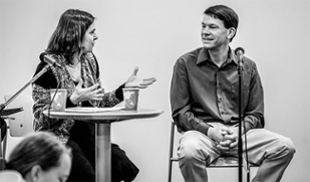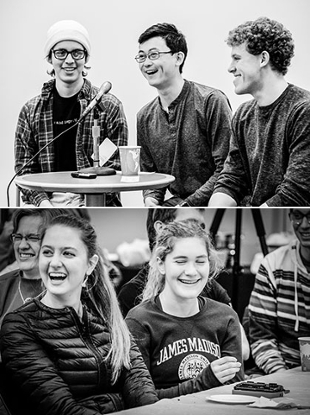No joking, comedy has a place for teaching science
NewsSUMMARY: The demystifying started by having the comedy troupe members asking Whitmeyer questions in an attempt to find out what kind of scientist he was. After accomplishing that, the next task involved the trio trying to explain geologic terms.

Who would have thought a shrimp could be an important tool to a geologist?
Well, not the crustacean that's a mainstay on seafood restaurant menus, but SHRIMP.
The acronym for Sensitive High-Resolution Ion Microprobe certainly stumped Diego Salinas, Alan Chen and Alex Jacobs, three members of New & Improv.'d, JMU's only comedic improvisation troupe. While the three comedians may not have received a passing grade for their guesses at what SHRIMP stood for, they did quite well keeping an audience of about 100 people entertained as they "demystified" science with Dr. Steve Whitmeyer, a professor of geology and environmental science at JMU.
 The Thursday evening (Feb. 18) event on the third floor of Rose Library was the fifth installment of a series called "Demystifying the Expert."
The Thursday evening (Feb. 18) event on the third floor of Rose Library was the fifth installment of a series called "Demystifying the Expert."
"We want to serve science on the comedy plate," the evening's co-moderator, Dr. Anca Constantin told the crowd at the beginning of the 90-minute forum.
Constantin, an astrophysicist in the department of physics and astronomy, received a $3,000 Faculty Senate grant along with her co-host and physics department colleague, Dr. Klebert Feitosa, to boost the event's profile. The money will be used to continue creating podcasts of the events and to develop a website for hosting the podcasts and photos. The money will also pay for the catered snacks and beverages at the events.
The demystifying started by having the comedy troupe members asking Whitmeyer questions in an attempt to find out what kind of scientist he was. After accomplishing that, the next task involved the trio trying to explain geologic terms. Salinas had a pretty good handle on orogeny — the forces and events that lead to large structural deformations of the Earth's crust, including mountains — and the term tectonic was blurted out quite frequently. Good thing the good-natured Whitmeyer was there to clarify things.
"The power of this program stands in its ability to bring together distinguished JMU experts and talented student comedians in skillful yet palpable ways to awe their community." — Dr. Anca Constantin
The final part of the show involved the trio discussing statements about Whitmeyer in an attempt to separate the truth from the not-so-true. To no one's surprise, it was true that Whitmeyer favored "The Flintstones" over the "Jetsons" when it came to choice of cartoons. A little more surprising was that he worked as a supermarket manager for quite some time before returning to the University of New Hampshire, where things didn't go so well the first time around, to get his geology degree. We won't divulge that initial GPA here.
Students Matthew Medwed and Sydney Fender found the format conducive to learning. Both College of Business majors said they enjoyed the atmosphere and both had plenty of notes in their notebooks.
One of the interesting facts, Medwed said, came from Whitmeyer's discussion of sinkholes, especially their prevalence on the east side of campus. An avid skier, Medwed also said he did not realize that ski slopes in North America, such as those at Massanutten Resort 30 minutes from campus, are built on north-facing slopes because they get the least amount of sun and thus hold snow longer.
Constantin said the success of the initial programs, with support from the JMU Libraries’ JMuse Cafe initiative, demonstrated the forum's potential to become a permanent and efficient venue for science outreach at JMU. "The power of this program stands in its ability to bring together distinguished JMU experts and talented student comedians in skillful yet palpable ways to awe their community," she said. "The overarching goal of the program is to pioneer a low-cost but incredibly profitable method of science education that can be replicated worldwide."
So what exactly is a SHRIMP? Whitmeyer explained that it is a tool used to determine the isotopic composition of minerals like zircons, which helps geologists determine the age of rocks and where they might have originally formed.
The final Demystifying the Expert event for this school year will be March 24.
By Eric Gorton, JMU Communications & Marketing

